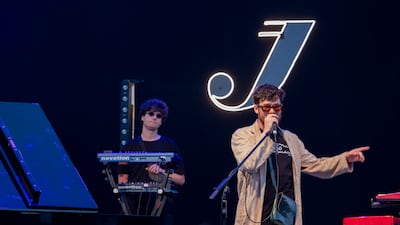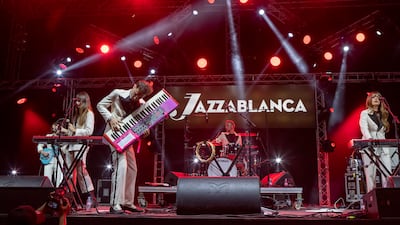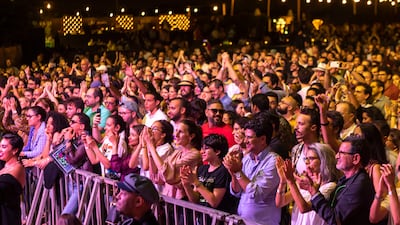The Jazzablanca Festival has always thrived because of community support.
The annual music event recently received a vote of confidence with the announcement it will now be held under the patronage of Morocco's King Mohammed VI.
The move finds the eclectic affair, which is on until Saturday, added to a list of high-profile cultural events including Rabat’s International Book and Publishing Fair and the popular music festival Mawazine, as well as the Marrakech International Film Festival.
“It is an incredible honour to receive this support and it just motivates us to keep making this festival better,” founder Moulay Alami tells The National during opening night on Thursday.
“What makes us so proud is that this is a home-grown event done in a private capacity by a small and dedicated team. We began this festival in 2006 and we have built it slowly and it has been embraced by the community.
“Hopefully with this recognition by our king, we can act as another example to the Moroccan culture scene on how to create strong events sustainably.”

The hard work is paying off. From humble beginnings, Jazzablanca has grown in stature and size.
It is now held on the grounds of sprawling Anfa Park with several stages, in addition to a satellite event at United Nations Square in central Casablanca with local acts.
The performers who took to the stage on opening night were typical of the festival’s mix-and-match approach.
The funk and disco sounds of Nile Rodgers and Chic were heard alongside the avant-garde electronic jazz of the UK’s Kamaal Williams, while the pulsating new wave synth-pop of French group La Femme went down a treat after an evocative set by Gambian kora virtuoso Sona Jobarteh.
A disco and pop masterclass

But there was no doubt regarding who stole the show that evening.
Thanks to a career that has spanned nearly five decades, with hits either recorded for Chic or peers, Rodgers had the best problem of all – how to fit it all in a 90-minute show.
The answer was to punctuate the set with a flurry of medleys that casually underscored his pedigree.
It takes a certain swagger to drop brief sections of “a couple of songs I wrote with Madonna,” such as Like a Virgin and Material Girl before letting the new generation know he was behind that scintillating riff of Cuff It from Beyonce’s new album Renaissance.

This is all before getting into his seminal work with Daft Punk, including the modern pop hit Get Lucky and the live debut of the 2013 track Lose Yourself to Dance.
That alone would have made for a satisfying evening, but Rodgers also impressed with the vitality of Chic’s song book.
From the groovy opening riffs of Le Freak to the throbbing bass lines of Soup for One, the band – featuring the dynamic vocals of Kimberly Davis and Audrey Martells – had an irrepressible energy as they led us to the annals of disco history with the frequent divergence into Rodgers’ stellar work for Bowie (Let’s Dance), Duran Duran (Notorious) and Sister Sledge's We Are Family.
Moroccan desert grooves

Meanwhile at the Scene BMCI stage at United Nations Square, local band Izouran N-Sahara sang the blues.
Hailing from the rural Moroccan commune of Tagounite in southeastern Morocco, they played a blend of hypnotic blues rock that was full of call and response vocals in Arabic and Tamazight.
Alami says the group are indicative of the rich music scene blossoming in the region.
“What is happening in this part of Morocco – or if I am more precise, the south of the city of Agadir – is really interesting,” Alami says.
“There is a growing movement of bands who sing in their indigenous languages, as well as Arabic, and really present their music in a traditional yet modern way.”










